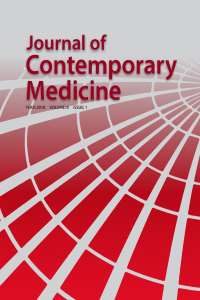Duygu AYHAN BAŞER, Cansu ALICI, Betül Sultan DEMİR, Enes Berk BİŞKİNER, Asena Merve OFLAZ, İzzet FİDANCI, Hilal AKSOY, Mustafa CANKURTARAN
Thoughts and attitudes of adults about medicines used for COVID-19; A descriptive study
Aims: With this study; it was aimed to determine the use of various medications or nutritional supplements to support immune system and opinions, usage status and attitudes towards the drugs currently used / recommended for the treatment of COVID-19, and the factors affecting drug use during the COVID-19 pandemic according to the condition of having COVID-19.
Methods: The descriptive research was conducted in Family Medicine outpatient clinics. Data were collected with a questionnaire prepared by the researchers through the internet (sites on social media) due to the pandemic. The e-questionnaire form was shared on the internet a total of 10 times at 6-day intervals.
Results: 1484 people participated, 60.8% were female, 51.5% was a healthcare professional. While 23.3% had a known disease; 19.3% of them had COVID-19 infection, 79% of them received outpatient medication. Although not recommended, it was observed that the most used drugs were Vitamin C and antipyretic drugs, followed by vitamin D and antibiotics. 87.5% who have had COVID-19 infection stated that they used the drugs as suggested/written on to them. The reasons of those who did not use drugs: fear of its side effects, not seeing it necessary, using herbal products and observing and using it if necessary. People who had live a person under the age of 18 living in the same household (p=0.042), who had a chronical disease (p=0.014) and who were regularly drug users (p=0.003) were reported that they used drugs as suggested / written on them.
Conclusion: Infodemic causes the spread of false information about the disease and its treat-ment both among the public and in scientific circles. The results of our study also support this situation. The healthcare system should be structured in accordance with the pandemic condi-tions in order to explain the importance of the use of medicines.
Keywords:
COVID-19, medicines, nutritional supplements, infodemic,
___
- 1. Velavan TP, Meyer CG. The COVID-19 epidemic. Trop Med Int Health. 2020;25(3):278-280. doi:10.1111/tmi.13383
- 2. WHO (World Health Organization). WHO Coronavirus Disease (COVID‐19) Dashboard 2021. https://covid19.who.int/ Accessed: 26.04.2021
- 3. Republic of Turkey, Ministry of Health. COVID-19 Information Page. https://covid19.saglik.gov.tr/?_Dil=2 Accessed: 26.04.2021
- 4. Rosenberg ES, Dufort EM, Udo T, et al. Association of treatment with Hydroxychloro-quine or azithromycin with in-hospital mortality in patients with COVID-19 in New York State. JAMA. 2020;323(24):2493-2502. doi:10.1001/jama.2020.8630
- 5. Cao B, Wang Y, Wen D, et al. A trial of lopinavir-ritonavir in adults hospitalized with severe Covid-19. N Engl J Med. 2020;382(19):1787-1799. doi:10.1056/NEJMoa2001282
- 6. Beigel JH, Tomashek KM, Dodd LE, et al. Remdesivir for the treatment of COVID-19: preliminary report. N Engl J Med. doi:10.1056/NEJMoa2007764
- 7. Hacettepe Üniversitesi Tıp Fakültesi COVID-19 Pandemi Raporu (20 Mart-20 Kasım). Hacettepe İç Hastalıkları Derneği. https://covid19.tubitak.gov.tr/sites/default/files/inline-files/covid19_pandemi_raporu.pdf Accessed: 26.04.2021
- 8. https://covid19.saglik.gov.tr/TR-66926/eriskin-hasta-tedavisi.html
- 9. Hu Z, Yang Z, Li Q, Zhang A. The COVID-19 Infodemic: Infodemiology Study Analyz-ing Stigmatizing Search Terms. J Med Internet Res 2020;22(11):e22639. doi: 10.2196/22639.
- 10. The Lancet Infectious Diseases. The COVID-19 infodemic. Lancet Infect Dis. 2020;20(8):875. doi:10.1016/S1473-3099(20)30565-X
- 11. Jovic TH, Ali SR, Ibrahim N, Jessop ZM, Tarassoli SP, Dobbs TD, Holford P, Thornton CA, Whitaker IS. Could Vitamins Help in the Fight Against COVID-19? Nutrients. 2020; 12(9):2550. https://doi.org/10.3390/nu12092550
- 12. Wu Z, McGoogan JM. Characteristics of and Important Lessons From the Coronavirus Disease 2019 (COVID-19) Outbreak in China: Summary of a Report of 72314 Cases From the Chinese Center for Disease Control and Prevention. JAMA. 2020 Feb 24;323(13):1239–42. doi:10.1001/jama.2020.2648
- 13. Mario Gennaro Mazza, Rebecca De Lorenzo, Caterina Conte, Sara Poletti, Benedetta Vai, Irene Bollettini, Elisa Maria Teresa Melloni, Roberto Furlan, Fabio Ciceri, Patrizia Rovere-Querini, Francesco Benedetti. Anxiety and depression in COVID-19 survivors: Role of inflammatory and clinical predictors, Brain, Behavior, and Immunity,2020. 89: 594-600. https://doi.org/10.1016/j.bbi.2020.07.037.
- 14. Sofia Pappa, Vasiliki Ntella, Timoleon Giannakas, Vassilis G. Giannakoulis, Eleni Pa-poutsi, Paraskevi Katsaounou. Prevalence of depression, anxiety, and insomnia among healthcare workers during the COVID-19 pandemic: A systematic review and meta-analysis, Brain, Behavior, and Immunity, 2020. 88: 901-907. https://doi.org/10.1016/j.bbi.2020.05.026.
- 15. Stahlmann R, Lode H. Medication for COVID-19-an Overview of Approaches Currently Under Study. Dtsch Arztebl Int. 2020;117(13):213-219. doi:10.3238/arztebl.2020.0213
- 16. Karaağaç Y, Bellikci Koyu E. Viral Enfeksiyonlarda Vitaminler ve Mineraller: COVID-19 Odağında Bir Derleme Vitamins and Minerals in Viral Infections: A Review Focus-ing on COVID-19. İzmir Kâtip Çelebi Üniversitesi Sağlık Bilimleri Fakültesi Dergisi 2020; 5(2): 165-173
- 17. Bakan S, Deveboynu Şn , Tayhan Kartal F. The effect of antioxidant vitamins on im-munity in the COVID-19 pandemic. Eurasian JHS 2020;3(COVID-19 Special Is-sue):140-148
- 18. https://www.cdc.gov/coronavirus/2019-ncov/need-extra-precautions/people-with-medical-conditions.html
- 19. Martini N, Piccinni C, Pedrini A, Maggioni A. CoViD-19 and chronic diseases: current knowledge, future steps and the MaCroScopio project. Recenti Prog Med. 2020 Apr;111(4):198-201. Italian. doi: 10.1701/3347.33180. PMID: 32319439.
- 20. Phelps C, Sperry LL. Children and the COVID-19 pandemic. Psychological Trauma: Theory, Research, Practice, and Policy 2020;12(1):73–75. https://doi.org/10.1037/tra0000861
- 21. Sinha IP, Harwood R, Semple MG, Hawcutt DB, Thursfield R, Narayan O, Southern KW. COVID-19 infection in children. The Lancet Respiratory Medicine 2020; 8(5): 446-447.
- 22. Hu Z, Yang Z, Li Q, Zhang A. The COVID-19 Infodemic: Infodemiology Study Analyz-ing Stigmatizing Search Terms. J Med Internet Res 2020;22(11):e22639 doi: 10.2196/22639.
- Yayın Aralığı: Yılda 6 Sayı
- Başlangıç: 2011
- Yayıncı: Rabia YILMAZ
Sayıdaki Diğer Makaleler
Güncel Literatür Eşliğinde Çocuk Yaş Grubu Meme Kitlelerine Yaklaşım
Yusuf Atakan BALTRAK, Seniha Esin SÖĞÜT, Onursal VARLIKLI
Hastanede Yatan İnme Sonrası Rehabilitasyon Hastalarında Cinsel İşlev Bozukluğunun Değerlendirilmesi
Ali Nail DEMİR, Sanem Aslıhan AYKAN, Uğur GÜNGÖR DEMİR, Hakan TUNÇ
İntrakraniyal Kanamalar Sonrasında Oluşan Epileptik Nöbetin Erken Dönem Mortalite Üzerine Etkisi
Mehmet Ufuk CERAN, Umit TASDEMİR
Rasim Eren CANKURTARAN, Öykü TAYFUR YÜREKLİ, Naciye Şemnur BÜYÜKAŞIK, Osman ERSOY
Adölesanlarda Vücut Ağırlığının Uyku Kalitesi ve Uyku Süresine Etkisi
Beytül YILMAZ, Betül ÇİÇEK, Gülşah KANER
